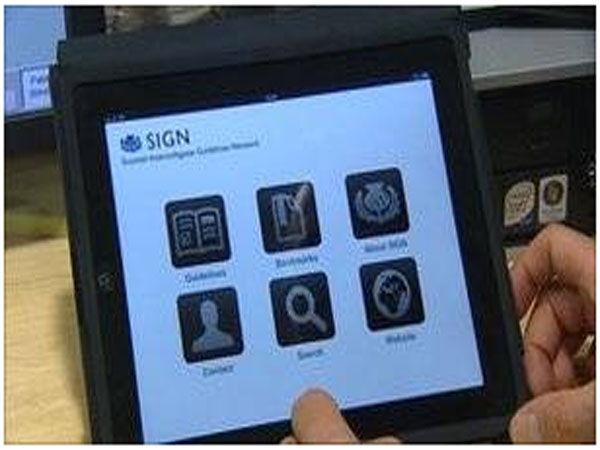



Date:24/06/11
 Scotland National Health Service has introduced SIGN app, a new health mobile application downloadable across the globe.
Scotland National Health Service has introduced SIGN app, a new health mobile application downloadable across the globe.
The Scottish Intercollegiate Guidelines Network (SIGN) app, developed by Healthcare Improvement Scotland member Professor John Kinsella, outlines what kind of care patients should expect when they suffer from particular medical conditions.
“The real advantage is that these guidelines are easy to access by members of the public,” said Kinsella.
Mobile phones no longer interfere with medical equipment, meaning doctors and other medical staff can use smartphones and hand-held tablet computers while working on the ward. “It is entirely logical that if you have a certain condition, it is very useful for you to be able to look up what care you should expect to receive.
This empowers patients and makes the discussion between the doctor and patient much better informed,” Kinsella added. The application offers guidelines on a wide range of conditions such as rheumatoid arthritis, eczema, diabetes and the management of asthma and psoriasis.
As the National Health Service produces more guidance on a larger range of conditions the SIGN app will be updated.
The app also has the potential to save the agency money by being more environmentally friendly. Until now Healthcare Improvement Scotland has had to print more than 15,000 paper copies of every guideline it produces.
Scotland offers new health app to the world
 Scotland National Health Service has introduced SIGN app, a new health mobile application downloadable across the globe.
Scotland National Health Service has introduced SIGN app, a new health mobile application downloadable across the globe. The Scottish Intercollegiate Guidelines Network (SIGN) app, developed by Healthcare Improvement Scotland member Professor John Kinsella, outlines what kind of care patients should expect when they suffer from particular medical conditions.
“The real advantage is that these guidelines are easy to access by members of the public,” said Kinsella.
Mobile phones no longer interfere with medical equipment, meaning doctors and other medical staff can use smartphones and hand-held tablet computers while working on the ward. “It is entirely logical that if you have a certain condition, it is very useful for you to be able to look up what care you should expect to receive.
This empowers patients and makes the discussion between the doctor and patient much better informed,” Kinsella added. The application offers guidelines on a wide range of conditions such as rheumatoid arthritis, eczema, diabetes and the management of asthma and psoriasis.
As the National Health Service produces more guidance on a larger range of conditions the SIGN app will be updated.
The app also has the potential to save the agency money by being more environmentally friendly. Until now Healthcare Improvement Scotland has had to print more than 15,000 paper copies of every guideline it produces.
Views: 930
©ictnews.az. All rights reserved.Similar news
- 24% of U.S. Adults have made phone calls on the Internet
- UNESCO puts sustainable learning online
- Australia gives incentives for the use of telehealth
- US launches computer programme for poor kids
- UN declares web access as human right
- Facebook growth slows in stalkerbase heartlands
- One Third of Millionaires Use Social Media
- Facebook Seeks Bigger Role in Software for Mobile Apps
- Icann increases web domain suffixes
- IBM launches new social networking platform for enterprises
- Google Notches One Billion Unique Visitors Per Month
- Internet providers cut international channel renting costs by 60%
- Azerbaijan launches standard time on internet
- Icann launches facility to ease DNSSec adoption
- Social network data mining yields worrying results for traditional media





















